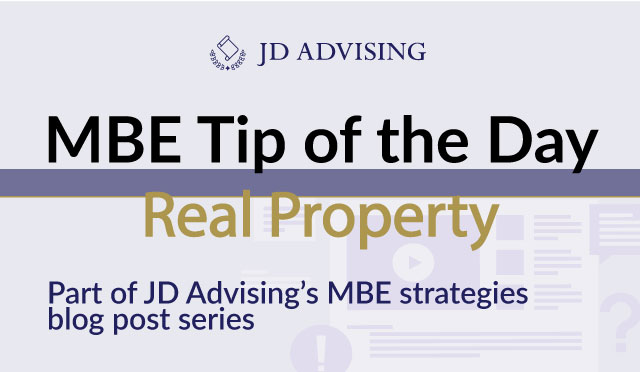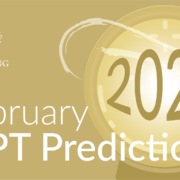MBE Tip of the Day: Real Property
MBE Tip of the Day: Real Property
Welcome to our MBE tip of the day series. This “MBE tip of the day” post focuses on real property.
You will see 25 scored real property MBE questions on the Multistate Bar Exam. In this post, we will review a real property question together. Note that we have posted several MBE tips (which you can find links to at the bottom of this post) that focus on a specific multiple-choice question that many students answer incorrectly. If you can master these questions, it could increase your MBE score by that many points if you see any of these issues tested again (which, by the way, you will!). These posts of MBE tips and tricks will not only cover substantive law but also strategy. So each “MBE tip of the day” post covers one highly-tested area of substantive law as well as an important MBE strategy. You can sign up to receive these posts directly to your inbox for the upcoming administration at the bottom of this page.
MBE Tip of the Day Instructions:
Do your best to answer this real property MBE question (before even looking at the answer choices and before looking at the answer below!) Ask yourself: What is the subject? What is the legal issue? What is the rule and analysis? What is the conclusion? Try to answer these beginning questions before even reading the answer choices. Then, uncover the answer as well as read more about our MBE tip of the day.
Show the MBE Question...
Real Property MBE Question
A man owns Blackacre, which is located in a jurisdiction with a notice recording act. The man is very short on money. He devised a plan to take out three mortgages from three separate banks. He first took out a mortgage from Bank A, who immediately recorded its interest. A week later, he took out a mortgage from Bank B, who did not immediately record. Two weeks later, the man took out a mortgage from Bank C. The man did not divulge the existence of either mortgage to Bank C, no one else knew of the mortgages, and there was no evidence of the mortgages on the property. Bank C never recorded its mortgage, but two days later Bank B recorded.
The man began to fall behind on his payments. He eventually defaulted on a payment to Bank C, who began foreclosure proceedings. At that time, there was $50,000 remaining on each of the mortgages. At the foreclosure sale, an investor bought Blackacre for $75,000. Assume all parties were properly joined.
Which of the following is a true statement about how the proceeds of the sale should be distributed?
(A) Bank C is not entitled to any of the proceeds because it never recorded its interest.
(B) Bank C’s mortgage will be paid off, the man will get the remaining money, and Bank A and Bank B’s interests will remain on the property.
(C) Bank C’s mortgage will be paid off, the rest of the proceeds will be applied to Bank B’s mortgage, Bank B can sue the man personally for the deficiency, and Bank A’s interest will remain on the property.
(D) Bank C’s mortgage will be paid off, the rest of the proceeds will be applied to Bank B’s mortgage, Bank B can sue the investor personally for the deficiency, and Bank A’s interest will remain on the property.
Subject:
Legal Issue:
Legal Rule and Analysis:
Choose an answer choice that most closely matches your conclusion and explain why the others are incorrect:
Show the Answer to the MBE Question...
Answer to the Real Property MBE Question
Subject: Real Property
Legal Issue: Mortgage priority and foreclosure
Legal Rule and Analysis: When considering how foreclosure proceeds are distributed, the priority of the various interests must be determined. All interests senior to the foreclosed interest will remain on the property, while all interests junior to the foreclosed interest will be paid off. If the sale did not generate enough money to pay off all of the junior interests, then the junior interest holder can still sue the debtor personally. To determine priority, the relevant recording act must be considered. The common law rule is first in time, first in right. However, recording acts have the ability to change the result by protecting a subsequent interest holder. Thus, even if a party acquires a mortgage after another, that party could still end up with priority if it meets the requirements for protection under the recording act.
In this case, we are told that the jurisdiction has a notice recording act. This means that a bank that obtains a mortgage after a different bank could still have priority if it did not have notice of the earlier mortgages. Here, Bank A was the first to acquire a mortgage and it recorded, putting all subsequent parties on notice of this mortgage. Bank A will therefore have the highest priority. Bank B was second to obtain a mortgage, but it didn’t immediately record its interest. This leaves Bank B vulnerable. And in fact, Bank C obtained a mortgage before Bank B recorded. We are told that Bank C did not have any actual or inquiry notice of any other mortgages. It would have record notice of Bank A’s interest, but not Bank B’s.
Therefore, Bank C has priority over Bank B. Bank B recorded its interest too late. The order of priority is:
Bank A
Bank C
Bank B
Since Bank C is the one who foreclosed, this makes Bank A a senior interest and Bank B a junior interest. The proceeds of the sale will first satisfy Bank C’s outstanding debt and then the remainder will be applied to Bank B’s interest. The amount will not be sufficient to cover all of Bank B’s interest, and so Bank B will be able to go after the man personally for the deficiency. As a senior interest, Bank A’s mortgage will remain on the property.
Bar Exam Tip: If you have trouble determining who will be paid first in a priority dispute, first figure out the order of priority (Bank A, Bank C, Bank B, as noted above). Next, put a star next to the party foreclosing (Bank C) and draw an arrow down. That “starred party” will be paid first. Then the money only moves down. So, Bank B will be paid next and anything leftover would go to the mortgagor (the man, in this case). Some students wonder why Bank A is not paid. Bank A is not prejudiced at all because Bank A’s interest still encumbers the property.
Conclusion: The proceeds will pay off Bank C’s mortgage and as much of Bank B’s interest as possible. Bank B can then go after the man personally for the deficiency. Bank A’s interest will remain on the property.
Look at the answer choices provided. Choose an answer choice that matches your conclusion. Review the other answer choices provided.
The answer choice (C) is therefore correct. (A) is incorrect because recording a mortgage is not mandatory in order to allow a lender to collect foreclosure proceeds. Bank C can still collect even though it never recorded. Recording puts others on notice and is beneficial, but is not a prerequisite to collection. (B) is incorrect because Bank B holds a mortgage that is junior in priority to Bank C. Therefore, Bank C’s foreclosure serves to wipe out Bank B’s mortgage, and the proceeds will be applied to Bank B. (D) is incorrect because Bank B cannot sue the investor for the deficiency. The investor is not a debtor on the mortgage that Bank B holds, and therefore the investor is not personally liable.
MBE Tip: Understand the importance that priority rules play in many different topics! Priority rules aren’t just applicable to who owns a piece of property. They can also be relevant to determine which mortgage or other sort of interest hold priority over another. A strong knowledge of recording acts becomes necessary in both of these situations. Further, priority plays a role in other subjects as well, including secured transactions. Therefore, this is a very important topic to learn as it will help you pick up points in many different places.
Show Summary of the Two Key Takeaway Points for the Day
Key Takeaways and Past Tips:
Takeaway for the Law: When a mortgage is foreclosed on, all senior interests will remain on the property while the proceeds will first pay off the foreclosed interest and then all junior interests. If there is a deficiency, the junior interest holders can sue the debtor personally.
MBE Tip: Don’t dismiss the importance of understanding priority rules in their various contexts!
If you would like to see “MBE tip of the day” posts from prior days, please check out all of our past MBE tip of the day archives here! We have several of them and we list them by subject!
Looking for additional MBE help? If you are looking for MBE help, read our 10 expert MBE tips here. Check out our step-by-step guide to improving your MBE score, please review this post for an overview of tips. If you would like to have the next MBE tip emailed to you when we come out with another one, please fill out the form below.
MBE Tip of the Day
Seeking MBE Assistance?
Seeking MBE Assistance?
- 📘 MBE Guide: Equip yourself with our FREE expert-crafted bar exam and MBE guides.
- Free Bar Exam Resource Center: Discover top resources, articles, and free webinars led by renowned bar exam professionals.
Top Resources as Vouched by our Students:
- MBE One-Sheets: One of our most highly acclaimed bar exam supplements!
- Bar Exam Outlines: Our comprehensive and condensed bar exam outlines present key information in an organized, easy-to-digest layout.
- MBE Private Tutoring: Opt for personalized, effective strategies.
- On Demand Bar Exam Course: Comprehensive bar exam preparation.
- Bar Exam Crash Course and Mini Outlines: Acclaimed and effective for a quick refresher.
- MBE Mastery Class, Real MBE Questions, and MBE Guide: Elevate your MBE preparation with these high-quality MBE supplements!
🔥 NEW! Check out our Repeat Taker Bar Exam Course and get introduced to our unmatched platinum Guarantee Pass Program.






Leave a Reply
Want to join the discussion?Feel free to contribute!